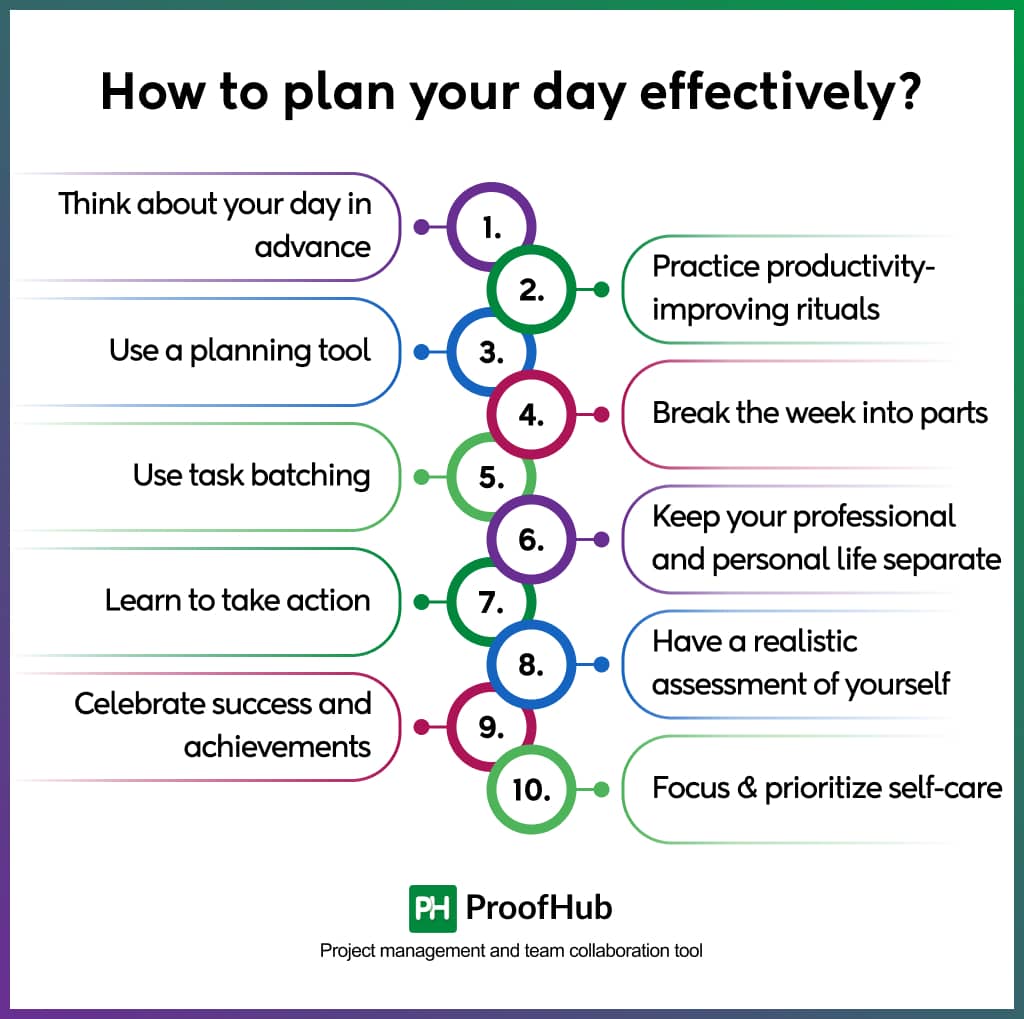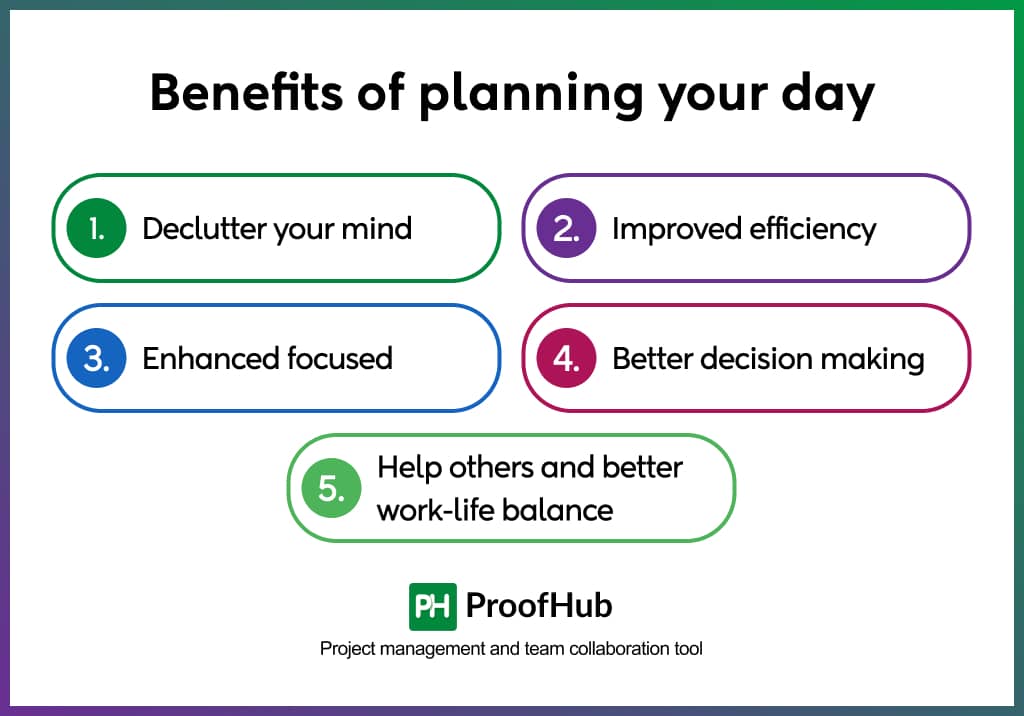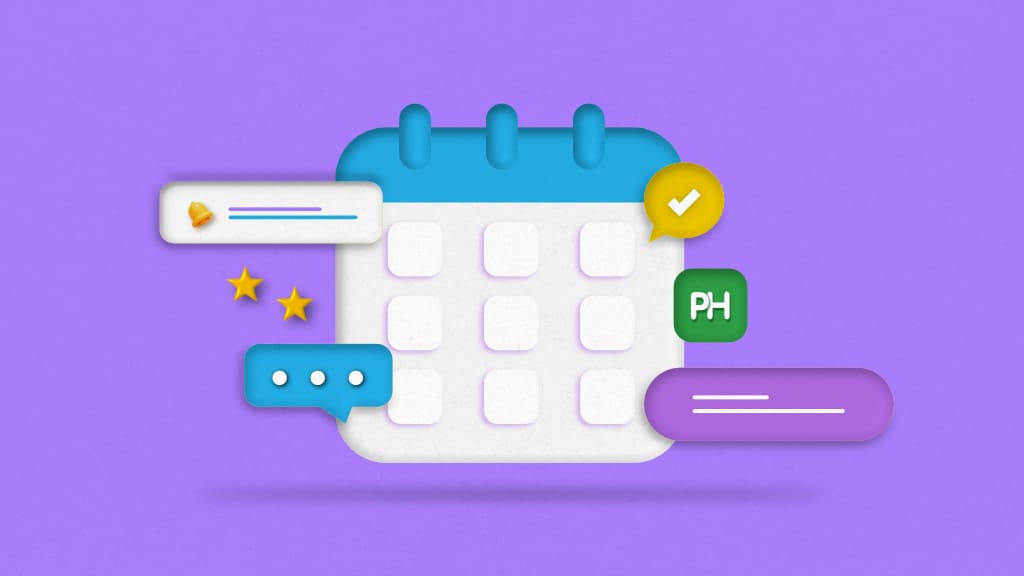Introduction
How to plan your day? I have researched and participated in many conversations and found out that an average office or knowledge worker is not productive for more than 4 hours.
We all reached the consensus that real productivity varies from 2.5 hours to 4 hours. Those who once in a while pushed their limits to 5 hours in a day, most of them reported that the next day took a hit.
My experience wasn’t different either!
So, I would like to make a clear judgment upfront that the topic of, how to plan your day to be more productive, is not about using some miraculous tips to make yourself work 6-7 hours in a day or 8 hours. It is all about planning, organizing, and utilizing your time well.
Let me show you the tips to plan your day that will improve your productivity and life! In this post, we will look at the 10 tips on how to plan a day based on real-life experience.
How to plan your day to be productive?

To plan your day at work, many have pondered upon and come up with various practical solutions. Here is a culmination of top productivity tips that work for me to plan my work day and get the most out of it!
1. Think about your day in advance
The first step to improving your productivity at the workplace is to know what goals you want to achieve during your workday. It’s essential to have a list of tasks that you want to accomplish, or at least have a general idea of what it takes for the task to be done.
Planning your day at work in advance will help you avoid wasting time and energy on tasks that don’t matter. It will also help you stay focused and organized.
A good way of organizing your time is by setting priorities for each task and completing them in order from the most crucial task on top-down until the last one on the bottom. You can use the Eisenhower Matrix to create a prioritized list based on the urgency and importance of a task.
It is essential to have daily planning. You will have a better time for your work and life if you plan your workdays. This idea is supported by the fact that people who do not plan their workday are more likely to be stressed and anxious.
2. Practice productivity-improving rituals
Many people feel that they are not productive because they don’t have enough time in their workday. They believe that the only way to be more effective is to work longer hours. However, there are many ways to make time for yourself and be more productive.
One of these rituals is to organize your workspace before you start your workday. It can be as small as filling a water bottle, decluttering the desk, and making a quick cup of tea. Doing this before resuming tasks keeps you focused and fully concentrated without hampering your workflow. The key is to find a routine that works for you and stick with it so that you can get more done in less time than ever before.
3. Use a planning tool
Wondering how to plan your day effectively like a pro? You need to learn to use planning tools.
A simple to-do list and some sticky notes can do wonders for you. But if you are someone who wants to set an estimated time for each task, track the time spent, visualize a day or week on a calendar, and block time for specific activities, you need a day planner.
There are many to-do lists or work management apps in the market that provide you with these features in an interactive interface to manage tasks.
For example, ProofHub allows you to create a task you want to do in a day, set an estimated time, and divide all of your tasks in a week into three categories: Overdue, Today, and Upcoming.
This makes it easy to organize all of your daily tasks in one place and define what tasks you need to complete today and how much time they will take. You complete more tasks in less time and are highly efficient and productive throughout the day.
Some tools allow you to set reminders to start working on specific tasks and alerts for due dates. This will make sure that you are always on track with your work.
4. Break the week into parts and schedule tasks accordingly
This is my personal favorite trick to plan my work and most people find it useful. I break my week into three parts: Monday, Tuesday-Wednesday, and Thursday-Friday.
- Monday: Mind is fresh and energy builds as the week goes, so start the week with less difficult but important tasks. It includes scheduling your week, completing any admin tasks, or reviewing goals and key metrics.
- Tuesday-Wednesday: Energy levels and focus are at its peak, so prioritize deep work and the most demanding tasks on these days. It includes coding, campaign management, and brainstorming sessions.
- Thursday-Friday: Energy begins to dip and it will be lowest on Friday so prioritize less demanding tasks on Thursday and use Friday for meetings, reflection, and relationships.
Thus, I allocate days of the week when I have the most energy to the most important and critical tasks. It can be the best way to plan your day too and help save time, perform better, and improve productivity.
5. Use task batching for time management
Task batching is the process of combining similar tasks so that you can complete them all at once. It improves productivity by preventing switching between different types of tasks and focusing on doing tasks of a similar nature at once. When you work in this manner, it saves time and energy.
However, in some cases, task batching is not possible. For example, you are working on different tasks or tasks with equally important deadlines. In that scenario, you should stick to doing one thing at a time.
You can use other time management techniques like the Pomodoro Technique, the 52/17 rule, and the Eat the Frog method to take action!
6. Keep your professional and personal life separate
If you want to be more productive, you need to organize your day for success. You can set up habits that will help you stay on track and make it easier to work on the tasks at hand.
One of the best ways to manage your day is by setting boundaries between work life and everyday life. This will ensure that you can prioritize your tasks accordingly with the amount of time you have available in a day.
Setting boundaries also helps you prioritize tasks that need to be done before or after work hours, such as family commitments, exercise, etc.
7. Learn to take action
Planning your day is a crucial step in achieving productivity, but you need to take action too. Spend some time on effective planning, such as what is essential, what’s not, and how much time it takes to complete each task on your list, and use the rest of the time for actions.
Do not overthink or worry about the results. The most important thing when it comes to productivity is the mindset. You can’t expect yourself to be productive if you don’t believe in it first. Learn how to organize your time and take action to manage it effectively.
8. Have a realistic assessment of yourself
There is no one-size-fits-all approach to managing your time. That’s because everyone has their own unique work style and personality. The key to success is understanding your personal preferences, strengths, and weaknesses. Therefore, it is essential to know what kind of person you are and your strengths & weaknesses.
Know your habits, your triggers that distract you, your capabilities of how much workload you can bear or not. This will help you effectively plan your day, manage your time, and organize your work effectively. In this process, you will also get a chance to prioritize and work on what needs the most attention and allow yourself the time to accept when you make mistakes.
9. Celebrate success and achievements
It is essential to make time to celebrate your achievements and success. It helps you stay motivated. Many people find it challenging to celebrate especially when you are trying to become more productive.
You want productivity in your day. Hence, you must strive. But do not let your desire for productivity turn toxic because excessive burnout will eventually lead to a decrease in productivity. Ergo, know your limits, when to exceed them, and when not to.
10. Focus & prioritize self-care
It’s easy for a person to get distracted by the noise of everyday life and lose focus on self-care. But without good mental and physical health, efficient time management and productivity is a dream.
Non-work-related activities like food, sleep, eating, and socializing impact your performance at work. Therefore, it is important to prioritize your overall health.
Benefits of planning your day

Planning your day helps you stay in control and manage work easily in the given time. Here are the key benefits of planning your day:
1. Declutter your mind
Planning your day involves organizing all the tasks in order or categories to complete them in the allocated time. This provides you with clear direction throughout the day on what you need to do and when. It reduces the unnecessary stress on the mind and provides a plan to follow.
2. Improved efficiency
Planning and organizing your day helps you improve operational frequency with better time management. You clearly know when you need to work and when to take breaks. You can define the time when you are most productive and schedule the most important tasks in that period. This way you can ensure you can complete tasks in less time which might take more effort if attempted during some other time of the day.
3. Enhanced focused
Planning your day helps you stay focused and saves you from distractions by letting you know when to take breaks and when to do focused work. This way you can better focus on work and dedicatedly work by cutting off the distractions and making the most of the time, effort, and energy.
4. Better decision making
Enhanced organization and clarity of your day’s schedule help you manage your time better and make better decisions. You know when you have the bandwidth for the less important things. Also, with enhanced clarity, you can reschedule tasks in your day’s plan effectively to meet urgent requirements.
5. Help others and better work-life balance
Clear goal setting and having a plan provide a sense of control over your day. You can achieve a better work-life balance, help others in doing tasks, and dictate how your time is spent. This proactive approach can help you maintain a balanced lifestyle, accomplish your goals, and avoid unhealthy choices.
Plan your day for success
Planning your day helps you take control of your time and tasks to manage your workload effectively and complete tasks on time. I hope the mentioned strategies have helped you find an answer to the query of how to plan your day.
Using these day planning strategies you can plan your day and organize your time to be productive. With the right tools in place, you can win at the workplace and achieve your goals!
ProofHub is an excellent platform that can be used for effective day planning and managing the entire work. With its user-friendly tools at flat pricing with a per-user fee, you can prioritize tasks, set deadlines, and collaborate efficiently with your team, making your workday more structured and productive.
FAQs
How do I know if my daily planning is effective?
The best measure is to track whether you are meeting deadlines or not. It does not have to be a 100% success rate for daily planning to be called effective. Even if you have made improvements from the past, it is a win. Rest, it is recommended to request expert insight from your direct manager about your daily planning and keep making improvements.
What role does self-discipline play in daily planning?
Self-discipline plays a massive role in daily planning. At first, without self-discipline, you cannot even build a habit of daily planning, let alone the rest. A person with self-discipline and control is more likely to restrict the urges and work according to a plan.
How can I adjust my daily plan for unexpected high-priority tasks?
The best way to adjust your daily plan to deal with unexpected high-priority tasks is to allocate buffer time. Do not create a daily plan for the 100% of the time capacity. You cannot expect the ideal conditions. Plan for the risks in your daily schedule and allocate buffer time or flexible time to accommodate unexpected high-priority tasks.
Related articles

